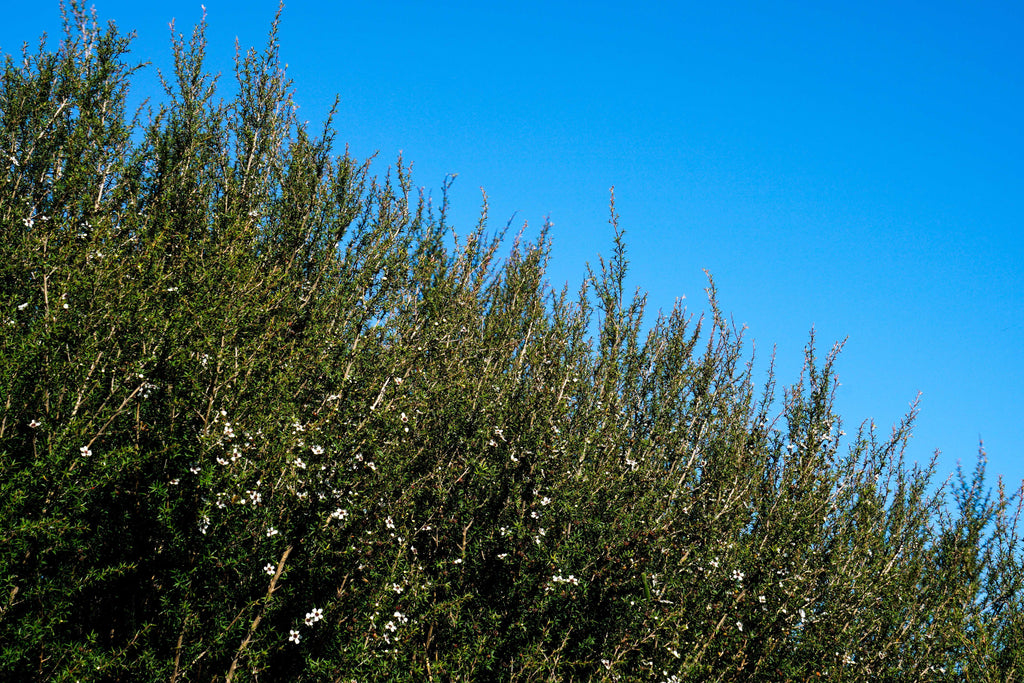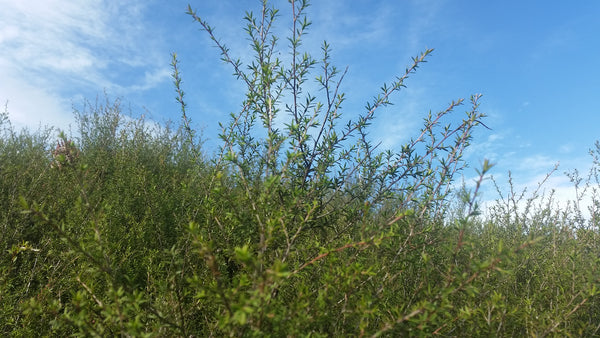Mānuka oil uses

Mānuka oil can be used for a wide range of purposes
Mānuka oil has a wide range of health properties, which make it effective as a natural supplement to support the treatment of numerous skin and body conditions. For many centuries, the native Māori of New Zealand used various parts of the mānuka tree for healing purposes. By extracting oil from mānuka leaves, we are able to harness the essence of the tree and use it in various body products such as soaps, creams, balms and more.
On this page, we discuss some of the ways that you can use mānuka oil and products made from mānuka oil to aid the natural healing process for a range of ailments and conditions.
Acne and oily skin:
“While the root cause of acne is a hormonally derived overproduction of sebum, it’s important to get the bacteria that feast on the sebum in blocked pores under control to reduce inflammation and improve the appearance and health of the skin. As the bacteria infect each hair follicle (pore) they produce enzymes which weaken the wall of the pore and cause the pore to burst and spread the bacteria to surrounding tissue. Killing the bacteria is an important part of any acne treatment regimen.”
- source
Mānuka oil, and East Cape mānuka oil in particular exhibits strong antibacterial and anti-inflammatory properties that are known to kill acne vulgaris, and help to reduce the inflammation and redness associated with acne. Mānuka oil is also a cicatrisant, which helps to promote new skin cell growth - assisting with healing scarring caused by acne.
How to use: wash daily with mānuka soap, and apply 25% mānuka oil blend as a spot treatment for problem areas.
Body odour:
People often confuse sweat and body odour. Sweat doesn’t smell - it’s actually the microorganisms that feed on sweat which cause the odour. The most common bacterial species found on human skin that contribute to these nasty smells are: corynebacterium spp., micrococcus luteus, staphylococcus epidermidis and staphylococcus hominis.
Most commercially available deodorants contain a range of harsh chemicals that are often intended to block the pores from secreting sweat and smells. Mānuka oil is a natural deodorant that addresses odours by killing the microbes responsible, and nourishing your skin in the process.
How to use: wash daily with mānuka soap or add mānuka oil to your shower gel/liquid soap. Use daily for best results.
Smelly feet:
Foot odour is unpleasant, and affects many people. If you have bad foot odour, taking your shoes off around other people can be downright embarrassing. Mānuka oil has been tested against the most common strains of bacteria that are known to cause foot odour: staphylococcus aureus, staphylococcus epidermidis, micrococcus luteus and acinetobacter calcoaceticus.
"At concentrations below 0.01% for most of the test bacteria, mānuka oil proved to be bactericidal"
How to use: dilute a few drops of mānuka oil into your liquid soap/shower gel and wash thoroughly every day. You can also put a few drops of mānuka oil into a bucket of warm water and soak your feet in it.
Athlete’s foot:
Also known as tinea pedis, athlete’s foot is a fungal infection that often results in itching, scaling and redness. Mānuka oil exhibits powerful antifungal properties that are very useful for combating the fungi responsible for athlete’s foot.
How to use: apply a few drops of 25% mānuka oil blend with a cotton ball twice daily. Keep the skin dry between applications. Continue to apply for 5 days after visible signs of infection have gone. You can also put a few drops of mānuka oil into a bucket of warm water and soak your feet in it for deep healing action.
Itchy scalp and dandruff:
How to use: add 10 drops of pure mānuka oil to a dollop of shampoo. Massage into your (wet) hair and scalp. Leave for 5 minutes before rinsing out. You can also make an overnight treatment by mixing pure mānuka oil with a carrier oil such as fractionated coconut oil or sweet almond oil. Massage it through your hair and into your scalp, then cover with a shower cap to protect your bedding. In the morning, shampoo your hair as normal to wash it out.
Cuts, scratches and grazes:
Open wounds are a breeding ground for bacteria. Mānuka oil (especially East Cape mānuka oil) is a perfect topical agent for helping to clean wounds, prevent infections and promote healing.
How to use: clean out the wound thoroughly, making sure to remove any dirt and debris. Dilute several drops of pure mānuka oil in a small amount of water or oil, stir briskly and dab the area with a cotton ball to wash away the nasties. Cover with a plaster or bandage to prevent contamination. For extra protection, add a few drops of mānuka oil to wound before covering.
Skin irritation, chafing and rashes:
Mānuka oil does not cure everything. However, it does provide an effective way to address inflammation and can help to reduce the occurence of common rashes and some minor skin conditions.
How to use: apply 25% mānuka oil blend twice daily or as required.
Soothing sunburn:
Packed full of anti-inflammatory goodness, mānuka oil is great for reducing inflammation and helping to alleviating pain from sunburned skin. It is also useful for relieving stinging and itching once the burn subsides.
How to use: apply cold water to remove the heat and gently rub mānuka cream into the sunburn. This will keep your skin moist and help to relieve itchiness later on. If your skin is too sore to rub oils and creams into your skin, you can mix mānuka oil and water and spray onto the affected area, or blend with cold aloe vera gel for optimal benefits.
Insect repellent and insect bites:
Mānuka oil is a natural insecticide, which is helpful for keeping away mosquitos, and relieving itchiness from bites. Remember to bring mānuka oil on your next camping trip!
If you get bitten, mānuka oil is a great natural alternative to use instead of synthetic antihistamines. With strong anti-inflammatory and antibacterial properties, continual application will help to prevent infections from creeping into broken skin, and will help to address the redness and swelling.
How to use: apply a few drops of mānuka oil to exposed skin to help keep the bugs away. If you get bitten, rub a few drops of 25% mānuka oil blend into the affected area twice daily until the itchiness and discomfort has subsided.
Fungal infections:
The powerful antifungal properties of mānuka oil make it a great product to help with fungal infections.
How to use: apply a few drops of pure mānuka oil with a cotton ball into the affected area twice daily. For sensitive areas, dilute pure mānuka oil with your chosen carrier oil, or use our 25% mānuka oil blend. Continue to apply for 5 days after visible signs of infection have disappeared.
Rheumatism and muscle pain:
Mānuka oil is great for releasing muscular tension, easing aches and promoting relaxation. The anti-inflammatory properties of mānuka essential oil are very useful for soothing sore muscles.
How to use: dilute a few drops of pure mānuka oil with your favourite carrier oil, and massage into the affected area. You can also add 8-10 drops of mānuka oil to your bath to help relax your muscles.
Kānuka oil is also effective for relieving muscle and joint pain. Thanks to the high alpha-pinene content of kānuka oil, it absorbs into the skin faster and seeps deeper into muscles. Click here to learn more about the uses of kānuka oil.
Stress relief:
How to use: if you have a diffuser at home, add a few drops of pure mānuka essential oil and diffuse into the atmosphere as usual. If not, you can simply inhale mānuka oil directly by placing a few drops in your palms, rubbing your hands together and inhaling the vapour. Alternatively, you can put a few drops of mānuka oil into a bowl or sink of hot water and inhale the vapour for 5 minutes.
Inhaling the vapour from mānuka oil is also known to be great for addressing congestion and minor respiratory complaints.

There are many more uses for mānuka oil which aren’t listed here. However, these are some of the most common ways that it is used for skin conditions and around the home. If you use mānuka oil for other purposes and find it particularly helpful, please do let us know by sending us an email, or connecting on Facebook or Instagram. We would love to hear your feedback!
Next topics:
Disclaimer: these statements have not been evaluated by the Food and Drug Administration. These products are not intended to diagnose, treat, cure or prevent any disease.
